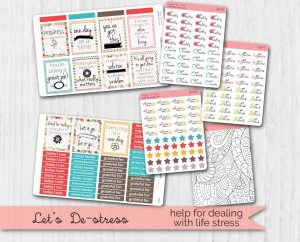
I love my job. And I know how lucky I am to be able to say that and mean that.
I love what I do every day. I look forward to going to work and when the workday is done, I usually feel very satisfied about what I have been able to do.
I don’t create anything. I don’t make anything. I don’t introduce any new ideas into the world. I sit across from people, about six clients or couples a day, listening to their problems and working with them to help them come up with solutions. That’s about it.
I don’t really have anything at the end of the day to “show” for those hours I was at the office. I would say that quite often I will never know if any of the therapy that takes place has had any impact on a person I have worked with.
Of course, I use my own observation and judgment to try to determine if I am seeing someone trying out new coping skills or making headway in dealing with a difficult situation. Sometimes I get feedback, which is always helpful, whether it is positive or constructively critical. I can learn from it all.
How Do You Do This All Day?
I often get asked, “How do you do this all day?” I reply, “Do what?” “Sit and listen to people whine, cry, and complain all day long.” Then my eyebrows usually go up…because I get so amused by this question. (I can’t help it!) See, I guess I don’t perceive what my clients are doing as whining, crying, and complaining. I guess if that is all they are doing, then after a while I think that would get pretty uncomfortable for all of us.
A lot of people do cry…I’m a big fan of crying, so that’s not a problem for me. Kleenex is my overhead. But my clients aren’t “whining and complaining.” They are talking to me about their pain, their sadness, their anger, their confusion, and their problems. They are seeking solutions, answers, a way to deal with what they are facing in their lives.
But you want to know the really weird thing? I don’t really have all the answers and I can’t make anyone change!
So, You Get Paid To Just Sit There?
Um, no. Okay, so I don’t usually have all the answers. But I have a lot of the answers, based on research and experience. And, I do have suggestions about something someone can experiment with to see if it will bring about some change in a positive direction. So even if I don’t have answers sometimes, I always have ideas.
I always have compassion for what people are going through and can provide reassurance that they have everything within them that is required to be able to survive it. It’s true, the one thing I cannot do for any client is make them change. I do not have the ability to control any other human being on this planet, nor would I want that kind of control.
If change is going to happen in someone’s life, it’s going to be because he or she decides to do something differently and then does it. Talking about doing it in therapy isn’t going to create change. It may help someone to think through options. It may help them to find the courage within to take a risk. It may help someone to see that it is really up to them to make it happen.
But I can’t do anything to make change happen in their lives. And I’m not responsible for making change happen in their lives.
Well, Somebody Is Responsible For This…
I am a very big believer that it is not right to hold people responsible for things over which they have no control. Most people would agree with this premise.
Only if I have control over something can you then hold me responsible for it. So, when it comes to therapy, since I do not have control over what any client says or does, that is also not something I am willing to take responsibility for.
Whether a client decides to tackle an addiction, face their problems, do something to bring about change…I have no control over this. And I am not responsible for whether they do or do not do these things. What I believe I do have control over, and what I think we all have control over (at least to some degree) is what we say and how we say it, and what we do and how we do it. I have control over how I am when I am working with a client in a session. I have the ability to be honest, respectful, and genuine in my communication with them.
I can control my behavior. I can give my 100% in each session, bringing everything I have learned and everything I know, to each problem a client and I are examining. I can behave ethically, following all the legal guidelines for my profession, and follow the best practices based on the most current research in the field of psychotherapy.
That is what I have control over. So that is what I am responsible for.
I Don’t Bring Your Problems Home With Me…

So, if I have given my best in a session, thought of everything I can think of to help a client work through an issue or look at a problem in a different way, been the best therapist I know how to be at this point in time in my life…then I have done the best job I can.
What happens after that is not up to me. It is up to the client. It is their responsibility to decide what is right for them, what is healthy for them, and to make changes or not based on that. I can go home and know I have done what I can do.
This is why I don’t “bring clients’ problems home” with me. Because they aren’t MY problems!!!! Maybe that sounds kind of heartless….let me explain, because one thing I am definitely not is heartless! 🙂
And That Allows Me To Continue To Care…
Just because I don’t bring clients’ problems home with me, doesn’t mean I don’t care about the clients I work with or care about how they are doing. I do, very much!. And I think about clients outside of sessions all the time.
I wonder how they are doing, I may replay a part of a session in my head, turning it over to find a better way to intervene, deciding I could do something different next time. I will often do extra research on a particular problem, diagnosis, or form of treatment so I can do a better job with someone.
When there’s nothing I can really do about someone’s situation other than what I have already done, I will say a prayer for someone who I know is going through a really rough time. I am, like everyone else, and above all else, a human being. I respond to hearing about pain, loss, trauma, and tragedy in the same way any human does: I care. I feel. I want to help if I can.
We are all in the same boat, together. What happens to one person, happens to us all. What affects one person, affects us all. I believe you will feel this if you are open to this and paying attention.
You Don’t Want A Therapist With Compassion Fatigue!
But, just because I care about what someone is going through, doesn’t mean I take that problem on as my own personal problem. It’s not my problem. It’s that person’s problem. It’s not my life issue. It’s their life issue. I separate my problems from my clients’ problems for a very good reason…it would become completely overwhelming if I didn’t!
When I am working, I am responsible for doing the best I can to help them do just that…helping them take responsibility for what they have control over. And helping them to cope with the things in life that are happening over which they have no control.
When I’m not working, I am responsible for doing the best I can to put all I have heard and dealt with into perspective, not let that overwhelm me, and figure out what to do with my own thoughts and feelings about what is happening to these people I care about. Not taking the time to do this could lead to “therapist burnout,” which is defined as an imbalance between the psychological resources of an individual and the demands being made on those resources.
I want to always be emotionally available, able, and wanting to care for and help the people who come in to see me for help with something. Taking on other people’s problems as my own would slowly erode my ability to do this until I either can’t or don’t want to anymore. One of my greatest strengths is my ability to be compassionate, which is why another name for therapist burnout is “compassion fatigue.”
You Can Learn How To Do This, Too…
It’s not just a technique for therapists…you can learn how to “not take on other people’s problems”, too! When you’re with someone you care about, give them your time, love, and attention. Be there for them 100%, do what you have control over…what you have responsibility for.
Then, let that person be responsible for what they have control over and what you don’t…which is themselves. If they are going to change, grow up, stop drinking, be responsible…whatever. That’s within their control, not yours. You’ve done what you can do. You are still allowed to care and have feelings about someone else’s problems…you just try to recognize they are not your problems.
You’ve done your job, as a friend, a teacher, a coach, a parent, a partner, and a teammate if you have done what you can do in that capacity…you care, you have helped, and now you need to go take care of yourself and get a good night’s sleep.
So I will be taking good care of myself and leaving work at work… and I hope you will, too!
Dr. Anita Sanz, PhD, Psychologist
Mothers are People, Too…
Happy Mother’s Day! “If it’s not one thing, it’s your Mother!” There’s a saying in psychotherapy that goes “If it’s…
How To Cope with Things Outside of Your Control
Imagine the following scenario: You are in a large, beautiful interior space with everything you need to accomplish any task…
A Life Planner For Better Mental Health
Most people think using a life planner just helps you to remember dentist appointments and when your kid has soccer…
Self-Esteem “Off the Grid”
Love the concept of living off the grid? A home that creates its own energy and water supply, so that…
It’s Snark Week!
You know them… snarky people. The masters of that combination of sarcastic and cynical that ends up being smugly critical and…
A Season of Change
A Magical Time of Transition Have you ever walked out of your front door on an Autumn morning and you…
Can You Have Too Much Downtime?
Most people I know complain about their pace of life being too fast. “Crazy-busy” fast. They are trying to find…
Falling Out of Love Is Not the End
I’m Not IN LOVE Anymore I know you’ve heard this. You might have said it. “I LOVE her, but I’m…
Self-Esteem Is YOUR Job
Self-Doubt and Low Self-Esteem Not sure if you’re all that sexy and attractive? Do you constantly need approval from others?…
What Would You Attempt to Do if You KNEW You Could Not Fail?
What would YOU attempt to do if you KNEW you could not fail? Would you start your own business? Would…
Uh Oh…It’s Fall Again
If you suffer from Seasonal Affective Disorder, then that first cool hint of air, untinged by the humidity of summer,…
I Didn’t Put RELAX on my To Do List!
Maybe this isn’t your problem. Maybe your problem is you’re relaxing TOO much and the dishes have been sitting in…
Happily Married…With Children?!
Married With Children. I’ve counseled many couples through the transition from being single to becoming a married couple, and then…
You Have Permission
Got Critics? Do you have people in your life who are, shall we say, “unsupportive” of you? How about downright…
- Well Being (56)
- Life Hacks (18)
- The Big Picture (8)
- Health (10)
- Relationships (13)
- Holidays (7)
- Therapy (40)
- Anxiety (9)
- Depression (16)
- On The Couch (15)
- Life Planning (5)














